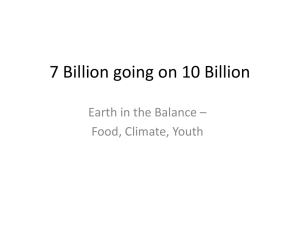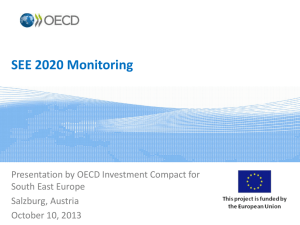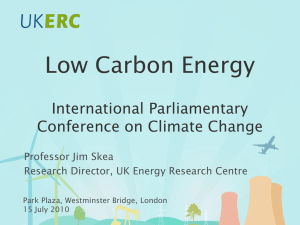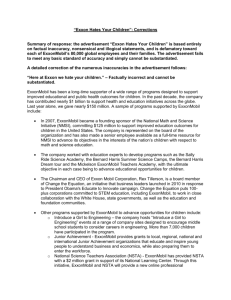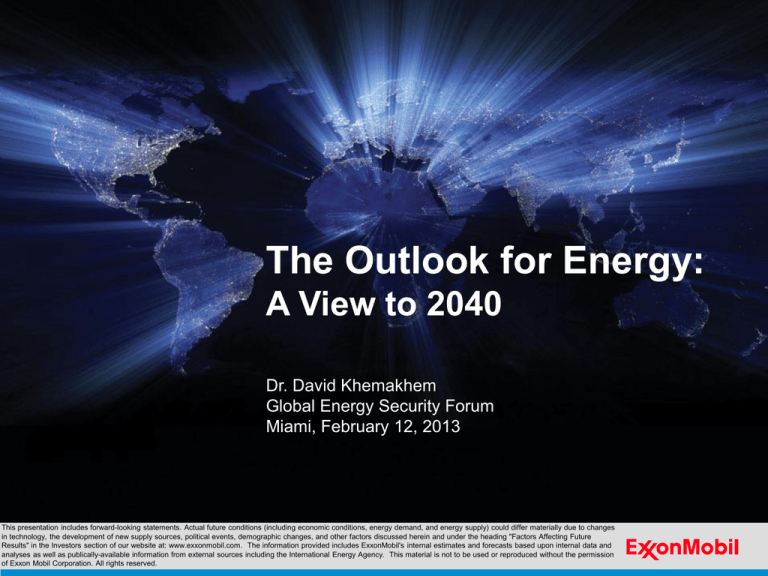
The Outlook for Energy:
A View to 2040
Dr. David Khemakhem
Global Energy Security Forum
Miami, February 12, 2013
This presentation includes forward-looking statements. Actual future conditions (including economic conditions, energy demand, and energy supply) could differ materially due to changes
in technology, the development of new supply sources, political events, demographic changes, and other factors discussed herein and under the heading "Factors Affecting Future
Results" in the Investors section of our website at: www.exxonmobil.com. The information provided includes ExxonMobil's internal estimates and forecasts based upon internal data and
analyses as well as publically-available information from external sources including the International Energy Agency. This material is not to be used or reproduced without the permission
of Exxon Mobil Corporation. All rights reserved.
Energy Outlook Development
100 countries
15 demand
sectors
20 fuel
types
technology & policy
ExxonMobil 2013 Outlook for Energy
CO2 Policies
2030
2040
CO2 “Proxy” Cost
~ 10
<
60 $/ton
~ 15 $/ton
~ 20 $/ton
~ 80 $/ton
ExxonMobil 2013 Outlook for Energy
Global fundamentals
Population Trends Impacts Energy Use
Population
Fertility Rate*
Global Demographics*
Billion
Children per Woman
Billion
9
8
OECD
9
Africa
7
Other
Non OECD
Age 65+
China
India
6
6
Southeast Asia
Latin America
6
5
Africa
Age 15-64
4
India
3
3
3
2
China
1
Age 0-14
OECD
0
2010
2020
2030
ExxonMobil 2013 Outlook for Energy
2040
0
1960 1980 2000 2020 2040
* Source: World Bank & United Nations
0
2010
2020
2030
2040
Economic Growth Drives Energy Demand
GDP
Energy Demand
Trillion 2005$
Quadrillion BTUs
125
1250
2010-2040 AAGR %
100
World
2.8%
2010-2040 AAGR %
Other
Non
OECD
75
3.9%
1000
China 5.6%
750
50
1.8%
25
250
United States
ExxonMobil 2013 Outlook for Energy
Energy
Saved
~500
500
Other
OECD
0
2000
World
1.0%
2020
2.3%
2040
0
2000
2020
2040
Tale of Two Worlds
Non OECD
OECD
Quadrillion BTUs
Quadrillion BTUs
500
500
Other Renewables
Biomass
400
Nuclear
Coal
300
200
Gas
100
0
2000
ExxonMobil 2013 Outlook for Energy
Oil
2020
2040
400
300
200
100
0
2000
2020
2040
Energy Mix Continues to Evolve
Quadrillion BTUs
225
0.8% 2040
200
Average Growth / Yr.
2010 - 2040
1.7%
175
2010
1.0%
150
-0.1%
125
100
75
2.4%
0.4%
50
25
5.8%
1.8%
Solar / Wind /
Biofuels
Hydro / Geo
0
Oil
ExxonMobil 2013 Outlook for Energy
Gas
Coal
Nuclear
Biomass
Electricity Generation Leads Growth
Energy Demand by Sector
Quadrillion BTUs
300
2040
2025
Electricity
Demand
250
200
2010
150
100
50
0
Electricity
Generation
ExxonMobil 2013 Outlook for Energy
Industrial
Transportation
Res/Comm
Residential/commercial
Household Growth Drives Residential Demand
2040
Million Households
750
2040
600
2010
450
300
150
0
Europe
OECD
N. America
ExxonMobil 2013 Outlook for Energy
Other
OECD
China
Africa
India
Latin
America
Russia/
Caspian
Middle
East
Other Non
OECD
Residential/Commercial Outlook
By Sector
Residential Energy Intensity
Fuel Demand
Quadrillion BTUs
Million BTUs per Person
Quadrillion BTUs
150
35
150
North America
125
Commercial
30
125
Other
Electricity
25
100
100
Europe OECD
20
75
75
Japan
Residential
15
Biomass
China
50
50
10
Coal
Gas
25
5
25
India
Oil
0
2000
2020
ExxonMobil 2013 Outlook for Energy
2040
0
2000
2020
2040
0
2000
2020
2040
Industrial
Industry Energy Demand Increases
Quadrillion BTUs
250
Paint
200
Fertilizer
Plastics
150
Chemicals
Automobiles
100
Textiles
Steel
Manufacturing &
Industry
Liquid
Fuels
50
Energy Industry
Other
0
1990
ExxonMobil 2013 Outlook for Energy
Natural Gas
Coal
Lubricants
Asphalt
Agriculture
2015
2040
Industrial Energy Demand
By Fuel
By Region
Quadrillion BTUs
Quadrillion BTUs
250
250
Market Heat
Electricity
200
Rest of
Non
OECD
200
Renewables
Coal
150
150
India
100
Gas
50
100
China
50
Oil
0
2000
ExxonMobil 2013 Outlook for Energy
2020
2040
OECD
0
2000
2020
2040
Electricity generation
Electricity Demand by Region
Non OECD
OECD
Thousand TWh
Thousand TWh
25
25
Other Non OECD
20
20
Russia/Caspian
Southeast Asia
15
15
Middle East
Africa
Other OECD
10
10
India
Europe OECD
5
China
5
North America
0
2000
ExxonMobil 2013 Outlook for Energy
2020
2040
0
2000
2020
2040
Fueling Electricity Generation Varies by Region
Electricity Generation
Growth in Fuels from 2010 to 2040
Quadrillion BTUs
Quadrillion BTUs
300
120
Renewables
250
90
Nuclear
Non OECD
200
Renewables
Nuclear
60
150
Gas
Coal
30
100
Coal
0
50
Oil
OECD
Gas
Oil
0
2000
ExxonMobil 2013 Outlook for Energy
-30
2020
2040
Non OECD
OECD
Global Electricity Generation Mix Evolves
Global Capacity Utilized
By Generation
GW
k TWh
35
1200
30
1000
Gas
25
800
20
600
Coal
15
400
Nuclear
10
Wind & Solar
200
5
Other Renewables
Oil
0
2000
ExxonMobil 2013 Outlook for Energy
0
2020
2040
Nuclear
Wind
Solar
Transportation
Transportation Demand
Sector Demand
Demand by Region
MBDOE
MBDOE
75
30
Rail
60
Marine
Aviation
‘40
25
‘25
20
45
Heavy Duty
15
‘10
30
10
15
Light Duty
0
2000
5
0
2020
ExxonMobil 2013 Outlook for Energy
2040
AP
NA
Europe
LA
ME
ROW
Light Duty Vehicle Fleet Grows, Mix Changes
Powertrain Technology
Millions of Vehicles
2010
2040
2025
500
400
PHV/EV
Advanced*
Full Hybrid
CNG
CNG
300
LPG
LPG
Conv.
DieselDiesel
Conv
Conv.
Gasoline
Mogas
Conv
200
100
0
North
America
Europe
OECD
ExxonMobil 2013 Outlook for Energy
Other
OECD
China
India
Middle East
*Full Hybrid, Plug-in Hybrid, Electric Vehicles
Latin
America
Other Non
OECD
Light Duty Vehicle Sales & Efficiency
Annual New Car Sales by Type
Incremental Vehicle Efficiency Gains
Million Cars
Miles per Gallon
150
20
Elec/PHV
47 MPG
Full Hybrid
125
Natural Gas
Conv. Diesel
100
Hybrid
15
Conv. Gasoline
75
Vehicle Size
10
Body & Accessories
50
5
Average
27 MPG
25
Powertrain
0
2010 2015 2020 2025 2030 2040
ExxonMobil 2013 Outlook for Energy
0
2010
2020
2030
2040
Today’s Vehicle Technology Choices
Estimated Driving Distance per Fill-up
5-Year Cost & Savings
2012$k
Full hybrid: 515 miles
20
Diesel: 435 miles
15
Cost above Conventional
Gasoline: 350 miles
E85: 260 miles
10
Fuel Savings
CNG: 210 miles
5
Electric: Up to 100 miles
PHV: Up to 40 miles + 450 miles
0
Full Hybrid
ExxonMobil 2013 Outlook for Energy
CNG
Plug-in
Hybrid
Elec
Heavy Duty Transportation Efficiency
New Truck Efficiency
Efficiency Impact
% Improvement, 2010-2040
MBDOE
75
45
Truck
Size
Demand w/o Efficiency
Demand
60
30
45
Hybrid
Body
30
Powertrain
Logistics &
Congestion
15
15
Body
Powertrain
0
0
'25-'40
'10-'25
Technology
ExxonMobil 2013 Outlook for Energy
Other
Regional
Impact
2010
2025
2040
Transportation Fuel Mix
Fuel Demand
Growth in Demand from 2010 to 2040
MBDOE
MBDOE
15
75
Non OECD
Other
12
Natural Gas
60
OECD
Fuel Oil
Jet Fuel
45
9
6
Biodiesel
3
30
Diesel
0
15
Ethanol
-3
Gasoline
0
2000
-6
2020
ExxonMobil 2013 Outlook for Energy
2040
Gasoline
Diesel
Jet Fuel
Fuel Oil
Natural
Gas
Other
Supply
Remaining Oil Resource
Crude and Condensate (BBO)
~1,000
Source: IEA
~1,100
~1,100
Russia/Caspian
~100
Europe
North America
~650
~150
Middle East
~200
~4,300
Latin America
Global
ExxonMobil 2013 Outlook for Energy
Africa
Asia Pacific
Liquids Supply
Supply by Type
Resource*
MBDOE
TBO
Biofuels
Other Liquids
120
100
6
NGLs
5
Oil Sands
80
Tight Oil
4
Remaining
Resource
Deepwater
60
3
40
2
Conventional
Crude & Condensate
20
0
2000
Cumulative
Production
1
0
2010
ExxonMobil 2013 Outlook for Energy
2020
* Source: IEA
2030
2040
2040
Global Gas Resource
Source: IEA; *Includes Europe Non OECD
6.2
4.3
1.6
4.9
Russia/
Caspian*
Europe
OECD
North America
4.5
1000 TCF
Middle East
30
2.6
25
20
Unconventional
2.5
15
Asia Pacific
Africa
Latin America
10
Conventional
5
0
World
ExxonMobil 2013 Outlook for Energy
Over 200 years coverage at
current demand
Natural Gas Supply and Demand Shifts
North America Gas Supply
Global Gas Supply
BCFD
BCFD
120
600
LNG
100
Rest of World
Unconventional
500
80
North America
Unconventional
400
Local
Unconventional
60
300
40
200
20
100
Rest of World
Conventional
Local
Conventional
0
2010
ExxonMobil 2013 Outlook for Energy
North America Conventional
2025
2040
0
2010
2025
2040
Growth in Unconventional Production
Production by Type
Production by Region
BCFD
BCFD
200
200
Rest of World
150
150
Asia Pacific
100
Shale
50
100
Americas
50
Coal Bed Methane
Tight
0
2000
ExxonMobil 2013 Outlook for Energy
2020
2040
0
2000
2020
2040
North America Energy Balance
Quadrillion BTUs
50
40
Oil
Net Exports
Net Imports
30
Regional Supply
20
10
0
2010
50
Total Energy Balance
2025
2040
Gas
Net Exports
125
100
Net Imports
Net Exports
40
75
Regional Supply
30
50
20
Regional Supply
25
10
0
2010
0
2010
2025
ExxonMobil 2013 Outlook for Energy
2040
2025
2040
Asia Pacific Energy Balance
Quadrillion BTUs
90
Oil
60
Net Imports
30
In-country supply
0
2010
90
2025
2040
Total Energy Balance
350
300
Gas
Net Imports
250
200
60
150
Net Imports
30
50
In-country supply
0
2010
In-country
supply
100
2025
ExxonMobil 2013 Outlook for Energy
2040
0
2010
2025
2040
Conclusions
ExxonMobil 2013 Outlook for Energy
Shale Gas and Hydraulic Fracturing
Conductor Casing
Surface Casing
Thousands of
feet of solid rock
Intermediate Casing
Production Casing*
*14,000 feet measured depth
Regional Energy Trends Evolve
By Region
Percent of World Total
100
North America
80
Europe
Russia/Caspian
60
China
40
Other AP
20
Africa
Middle East
Latin America
0
1980
1990
ExxonMobil 2013 Outlook for Energy
2000
2010
2020
2030
2040
Economic Choices for U.S. Electricity
Baseload, Startup 2030
2012 cents/kWh
$60/ton of CO2
16
Reliability
Cost
12
8
4
$0/ton
0
Coal
Gas
Nuclear
Onshore
Wind*
*Wind and solar exclude costs for integration, backup capacity and additional transmission
ExxonMobil 2013 Outlook for Energy
Utility
Solar PV*
Renewables Gain Share
United States
Europe
Asia Pacific
Percent of TWh
Percent of TWh
Percent of TWh
45
45
45
40
40
35
35
30
30
25
25
25
20
20
20
15
15
15
10
10
10
5
5
5
0
0
0
Solar
40
Geothermal
Biomass/Other
35
Wind
Hydro
30
'10
'20
'30
'40
*Biomass includes Municipal Solid Waste
ExxonMobil 2013 Outlook for Energy
'10
'20
'30
'40
'10
'20
'30
'40
ExxonMobil: Technology for Energy Challenges
Technology to address the twin challenges of increased
energy demand while mitigating risk from GHG emissions
Improving Efficiency
• Automotive technologies
– Vehicle light weighting
– ExxcoreTM: tire lining technology
– Advanced synthetic lubricants
• Power generation
– Cogeneration
– Wind turbine lube oils
Expanding Supplies
• Directional drilling
• Unconventional and liquefied natural gas
• Advanced biofuels
Reducing Emissions
• Natural gas for power generation
• Controlled Freeze Zone™
• Carbon capture and storage
• Global Climate & Energy Project
Costs Impact U.S. Heavy Duty Choices
3-Year Cost of Ownership
$k
5-Year Cost of Ownership
$k
450
2012
450
2012
300
Vehicle
Cost
300
Vehicle
Cost
150
150
Fuel
Cost
Fuel
Cost
0
0
Conv. Diesel
LNG-CI
Long Haul Truck
LNG Tanks
ExxonMobil 2013 Outlook for Energy
Conv. Diesel
CNG-SI
Short Haul Truck
CNG Tanks
Bio for David Khemakhem (k’mak’m)
David Khemakhem is an Energy and Technology Advisor at ExxonMobil.
He is a member of the Corporate Strategic Planning Department, where he
is responsible for assessing energy trends, emerging energy technologies,
and related market and public policy issues around the world. He is one of
the principal contributors to ExxonMobil’s long-term global Energy Outlook.
He is also active in communicating ExxonMobil’s view of the future of
energy to a wide variety of audiences.
David has worked with Exxon then ExxonMobil since 1997 in numerous
technical and management assignments covering activities in the United
States and around the world.
He started his career with Exxon Production Research Company in the
area of Wellbore Design and eventually became Team Lead for the Well
Integrity Group at ExxonMobil Upstream Research.
In 2001, he transferred to ExxonMobil Production Company as a
Subsurface Engineer overseeing completion and workover operations in
Colorado, Wyoming, California and South Texas.
In 2003, David relocated to Qatar, where he spent six years in a variety of
assignments, including Drilling and Completions Engineering Manager. In
this role he led a team of engineers working on RasGas’s 14 drilling rigs
during the development of the North Field.
In 2009, David transferred back to Houston, joining the ExxonMobil
Upstream Research Company as Well Performance Manager and then in
2010, he became the Unconventional Gas Recovery Manager.
The following year, in 2011, David moved to ExxonMobil Headquarters to
join the Corporate Strategic Planning team where he is helping in the
development of the Energy Outlook for 2013 and beyond.
David holds a Ph.D. in Mechanical Engineering from the University of
Minnesota.
Text in Box: Short Bio
Conductor Casing
Fresh Water Aquifer
Surface Casing
Intermediate Casing
Production Casing*
14,000 feet measured depth



